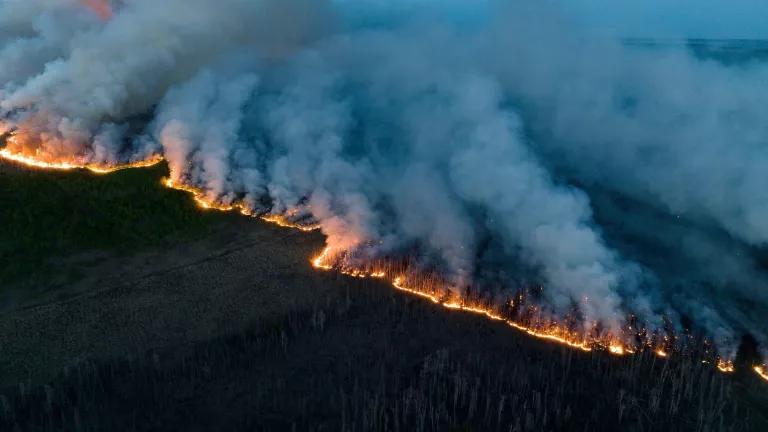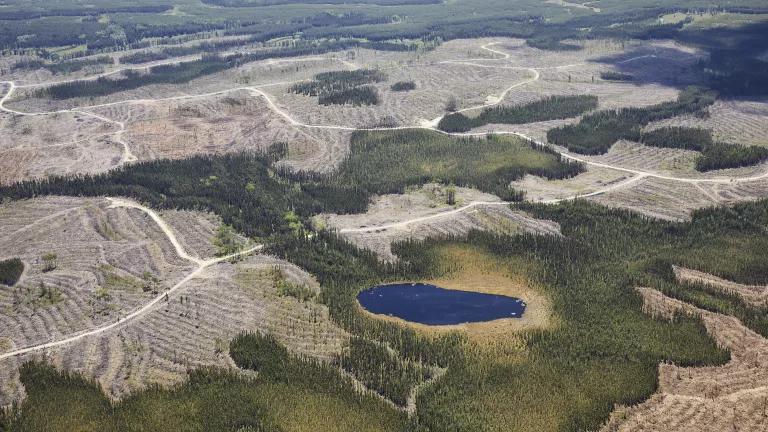Take Off the Mask: Canada Shirks Climate Promises—Again
Canada turns its back on the global climate yet again, announces a move to buy a 60-year-old, leaky pipeline and take over as owner of the country's most contentious propose tar sands pipeline.

Today, one the world’s richest countries asserted that it cannot afford the transition to a low carbon economy without further expanding its production of the world’s dirtiest oil. Oh, Canada. Despite a global bear hug following the Trudeau government taking power and becoming the poster child for climate action, Canada has vacillated between that role and that of a climate laggard advocating relentlessly for massive expansion of its tar sands oil production. Now, it has announced that it will take steps to nationalize the embattled Trans Mountain tar sands oil pipeline expansion that is such a bad bet that the company behind it—Kinder Morgan—has signaled with increasing clarity, that it had no interest in finishing the project.
The numbers on how astonishingly two-faced this move is speak for themselves:
- After 11 years of promising action, Canada’s annual greenhouse gas emissions have hardly budged: declining 28 million metric tons (MT) since 2005, well short of the 124 MT cut it has pledged to make by 2020, or the 220 MT cut it has pledged to make by 2030.
- Meanwhile, Canada remains near the top of the global list of climate polluters, unable to make any headway toward leaving the top ten, despite being barely in the top 40 in terms of population.
- Indeed, per capita greenhouse gas emissions in Canada have been another trouble spot for the country and have essentially stagnated at current levels despite some progress at the turn of the century. Canada now sits among a group of the world’s petrostates, with per capita emissions much higher than even Saudi Arabia or the United States.
But surely the revenues will pick up the slack! Again, the numbers Canada doesn’t like to tout publicly are nothing short of dismal:
- Since oil prices peaked, revenues generated from tar sands producers to the governments of Alberta and Canada have declined sharply, despite continued growth in production. While the recovery of the price of oil has helped slightly, revenues remain extremely low, with any growth more likely to go to filling existing budget gaps than making new investments in a modernized economy.
- The cost of environmental remediation—think America’s Superfund situation—is estimated to currently total more than all the revenue ever generated by the tar sands to date. The day tar sands oil becomes a global pariah (and that day edges ever closer), Canadian taxpayers will be on the hook for these costs, meaning they will have paid for an economic boondoggle of a pipeline and the environmental catastrophes it could facilitate.
Taking a step away from the numbers, there’s more trouble brewing. Just this weekend, the existing Trans Mountain pipeline (which Canada will soon own!) sprung a leak near Kamloops, BC. The incident proves, yet again, that with pipelines leaking, it’s only a question of when, not if. Against this backdrop, First Nation resistance to the pipeline takes on a whole new urgency as the threat to their rights and resources comes sharply into focus.
Then there are the ongoing legal issues around the pipeline that don’t just fade away to nothing with today’s news—indeed, some have already speculated that Canada’s action creates an even more unpredictable legal landscape. Environmentally, the Trans Mountain project poses even more alarming risks than its ancient twin: it would load nearly 600,000 bpd of tar sands oil onto oil tankers plying the Pacific coastline from Washington to California. Those tankers must sail through critical habitat of the highly endangered Southern Resident Killer Whales, a regional icon that has suffered as vessel traffic, rising levels of toxics, and loss of essential prey have all led to severe population decreases. Add oil spill risks—in the form of an oil that is nearly impossible to clean when spilled into water—and there is a near perfect storm of risks and harms associated with a project that the world simply does not need.
Last week, a group of more than 230 organizations located around the world sent a letter to Prime Minister Trudeau, urging him to drop his support for the Kinder Morgan project. Today’s actions are likely to amplify these calls. Read the full letter here.




